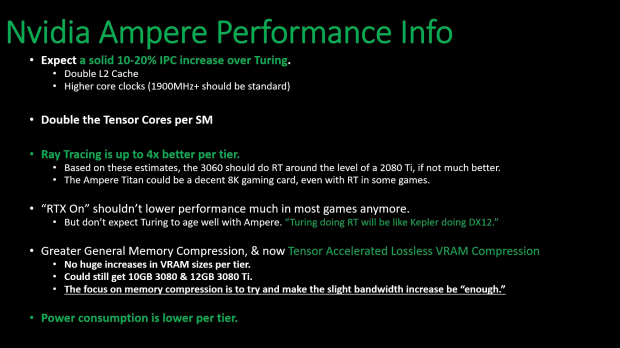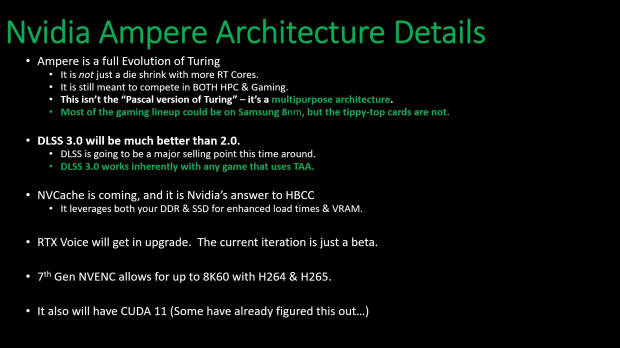D
Deleted member 2731765
Guest
First of all, before I start talking about Ampere, remember that rumours must always be taken with a huge grain of salt. Even the most reliable of sources can be given incorrect information, and vital details about future products could always be missing, or subject to change, until their official unveiling.
Though, I still think there is some credibility in this source IMO. Some of the points might hold true.
Nvidia's next-gen AMPERE GPUs are highly anticipated by Gamers and enthusiasts alike. Now some fresh information pertaining to NVIDIA's upcoming Ampere architecture was revealed by one YouTube channel, "Moore's Law is Dead". "Tom" in this video claims to have insider sources associated with this entire launch.
According to his source, "Ampere" architecture is expected to offer a 10-20% IPC increase, with 4X the Ray Tracing performance/RTX, and clocks that can be easily pushed to 2 GHz and above. It will also offer double the TENSOR cores per SM.
Most importantly NVIDIA is working on an overhauled "software stack" to counter AMD's Radeon Adrenalin Software. According to Tom's video, Ampere is not just a DIE shrink (from 14nm to 7nm) with additional RT cores, but instead it's an "overhaul" of the previous gen Turing architecture.
This part of the video is most interesting. It looks like Nvidia is going to introduce something called "NVCache" with the Ampere lineup, which will act similar to AMD's technology that debuted with Vega GPUs, which was HBCC (High Bandwidth Cache Controller). Similar to HBCC, NVCache will use some of the system RAM and SSD on any system, and it will optimize the VRAM usage, offering reduced "game" load times as well.
According to Tom, Ampere will cater to both HPC and Gaming segments. Ampere will also bring support for DLSS 3.0 that should work with any game that uses TAA.
There is a possibility that the GeForce "Gaming" cards could be fabbed on Samsung's 8nm process, while the HPC variants could go the TSMC 7nm route, though this is not final.
According to this YT source, the next-gen GeForce RTX 3060 "mid-range" GPU could have Ray Tracing performance similar to the now-flagship RTX 2080 Ti card.
We should hear all about Ampere (or at least as much as NVIDIA will share) during its GTC 2020 keynote in a few days. One more important point to remember though. There won't be any GTX cards in the entire Ampere lineup, since even the lowest spec cards are speculated to feature at least a few RT cores. So we should not expect any non-RT GPU.
Tom's sources say NVIDIA is likely to announce Ampere HPC products during the GTC 2020 pre-recorded keynote, with the consumer GeForce lineup expected to be announced sometime in September. Needless to say, things are going to get interesting in the coming months.
These are some speculated NVIDIA Ampere GPU specs. I suggest taking any leak with a "grain of salt" though.
GA102 - 84 SMs / 5376 CUDA cores / 12GB GDDR6 / 384-bit bus - 40% faster than RTX 2080 Ti.
GA103 - 60 SMs / 3840 CUDA cores / 10GB GDDR6 / 320-bit bus - 10% faster than RTX 2080 Ti.
GA104 - 48 SMs / 3072 CUDA cores / 8GB GDDR6 / 256-bit bus - 5% slower than RTX 2080 Ti.


Though, I still think there is some credibility in this source IMO. Some of the points might hold true.
Nvidia's next-gen AMPERE GPUs are highly anticipated by Gamers and enthusiasts alike. Now some fresh information pertaining to NVIDIA's upcoming Ampere architecture was revealed by one YouTube channel, "Moore's Law is Dead". "Tom" in this video claims to have insider sources associated with this entire launch.
According to his source, "Ampere" architecture is expected to offer a 10-20% IPC increase, with 4X the Ray Tracing performance/RTX, and clocks that can be easily pushed to 2 GHz and above. It will also offer double the TENSOR cores per SM.
Most importantly NVIDIA is working on an overhauled "software stack" to counter AMD's Radeon Adrenalin Software. According to Tom's video, Ampere is not just a DIE shrink (from 14nm to 7nm) with additional RT cores, but instead it's an "overhaul" of the previous gen Turing architecture.
This part of the video is most interesting. It looks like Nvidia is going to introduce something called "NVCache" with the Ampere lineup, which will act similar to AMD's technology that debuted with Vega GPUs, which was HBCC (High Bandwidth Cache Controller). Similar to HBCC, NVCache will use some of the system RAM and SSD on any system, and it will optimize the VRAM usage, offering reduced "game" load times as well.
According to Tom, Ampere will cater to both HPC and Gaming segments. Ampere will also bring support for DLSS 3.0 that should work with any game that uses TAA.
There is a possibility that the GeForce "Gaming" cards could be fabbed on Samsung's 8nm process, while the HPC variants could go the TSMC 7nm route, though this is not final.
According to this YT source, the next-gen GeForce RTX 3060 "mid-range" GPU could have Ray Tracing performance similar to the now-flagship RTX 2080 Ti card.
We should hear all about Ampere (or at least as much as NVIDIA will share) during its GTC 2020 keynote in a few days. One more important point to remember though. There won't be any GTX cards in the entire Ampere lineup, since even the lowest spec cards are speculated to feature at least a few RT cores. So we should not expect any non-RT GPU.
Tom's sources say NVIDIA is likely to announce Ampere HPC products during the GTC 2020 pre-recorded keynote, with the consumer GeForce lineup expected to be announced sometime in September. Needless to say, things are going to get interesting in the coming months.
These are some speculated NVIDIA Ampere GPU specs. I suggest taking any leak with a "grain of salt" though.
GA102 - 84 SMs / 5376 CUDA cores / 12GB GDDR6 / 384-bit bus - 40% faster than RTX 2080 Ti.
GA103 - 60 SMs / 3840 CUDA cores / 10GB GDDR6 / 320-bit bus - 10% faster than RTX 2080 Ti.
GA104 - 48 SMs / 3072 CUDA cores / 8GB GDDR6 / 256-bit bus - 5% slower than RTX 2080 Ti.



